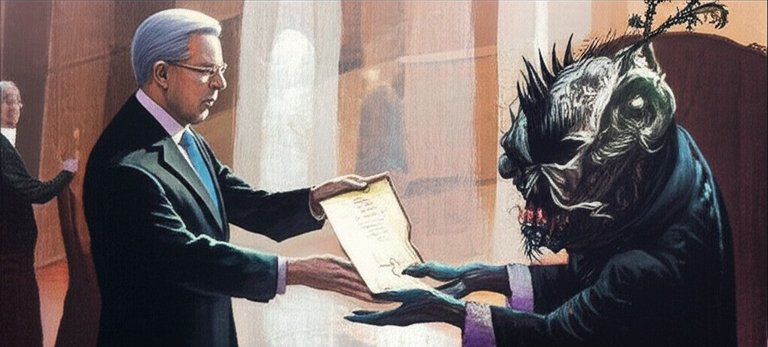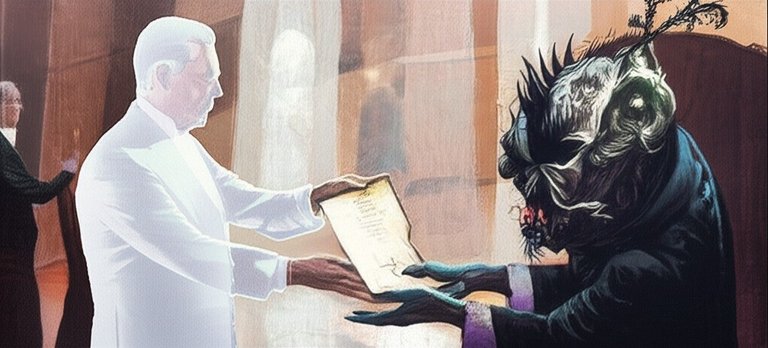[Esp./Eng.] El indulto es el disfraz de los favores políticos. || The pardon is the disguise of political favors.
If you prefer the English version, click on the following link 👉 HERE
El indulto es el disfraz de los favores políticos
El indulto presidencial, esa potestad reservada tradicionalmente a los jefes de Estado, encierra una paradoja en el tejido de la justicia contemporánea. Aunque se concibió, en su origen, como un resquicio de misericordia —un gesto de humanidad capaz de corregir excesos judiciales, ¿qué incauto se lo cree?—, la historia ha mostrado otra cara menos idealizada. A lo largo de las décadas, el indulto se ha convertido en una herramienta política, un comodín otorgado a conveniencia para fortalecer alianzas o neutralizar oposiciones. No es inusual descubrir casos en los que personajes cercanos al poder, involucrados en hechos polémicos o crímenes de alto perfil, han recibido este beneficio bajo discursos de reconciliación, pero en la práctica muchas veces ha sido una respuesta pragmática más que ética.

Studio IA
Me resulta fascinante cómo, en distintas latitudes y regímenes, el indulto suele emerger en coyunturas estratégicas: períodos preelectorales, crisis institucionales o momentos de tensión social. Adquiere así un matiz que se aparta de la justicia restaurativa y se adentra en lo utilitario. El filósofo Michel Foucault advertía que “la justicia no es más que la mascarada de la fuerza”, frase que resuena cada vez que un indulto parece responder más al cálculo político que a la compasión o al verdadero interés del bien común.
¿Qué sentido adquiere la justicia cuando su revocación selectiva depende de motivaciones ocultas y no de la equidad frente a la ley?
El indulto presidencial, esa potestad reservada tradicionalmente a los jefes de Estado, encierra una paradoja en el tejido de la justicia contemporánea. Aunque se concibió, en su origen, como un resquicio de misericordia —un gesto de humanidad capaz de corregir excesos judiciales, ¿qué incauto se lo cree?—, la historia ha mostrado otra cara menos idealizada. A lo largo de las décadas, el indulto se ha convertido en una herramienta política, un comodín otorgado a conveniencia para fortalecer alianzas o neutralizar oposiciones. No es inusual descubrir casos en los que personajes cercanos al poder, involucrados en hechos polémicos o crímenes de alto perfil, han recibido este beneficio bajo discursos de reconciliación, pero en la práctica muchas veces ha sido una respuesta pragmática más que ética.

Studio IA
Me resulta fascinante cómo, en distintas latitudes y regímenes, el indulto suele emerger en coyunturas estratégicas: períodos preelectorales, crisis institucionales o momentos de tensión social. Adquiere así un matiz que se aparta de la justicia restaurativa y se adentra en lo utilitario. El filósofo Michel Foucault advertía que “la justicia no es más que la mascarada de la fuerza”, frase que resuena cada vez que un indulto parece responder más al cálculo político que a la compasión o al verdadero interés del bien común.
¿Qué sentido adquiere la justicia cuando su revocación selectiva depende de motivaciones ocultas y no de la equidad frente a la ley?
Ven y participa, aún estás a tiempo. Toda la información la podrás encontrar cada día en la Comunidad #Freewritehouse. Específicamente, el día de hoy, aquí la publicación del prompt:
«indulto presidencial»

Portada de la iniciativa.

Dedicado a todos aquellos que, día a día, con su arte, hacen del mundo un lugar mejor.


**
1.519 / 5.000
The pardon is the disguise of political favors.**
The presidential pardon, a power traditionally reserved for heads of state, holds a paradox in the fabric of contemporary justice. Although it was originally conceived as a glimmer of mercy—a gesture of humanity capable of correcting judicial excesses. Who inadvertently believes that?—history has revealed another, less idealized side. Over the decades, the pardon has become a political tool, a convenient trump card granted to strengthen alliances or neutralize opposition. It is not unusual to discover cases in which figures close to power, involved in controversial events or high-profile crimes, have received this benefit under rhetoric of reconciliation, but in practice it has often been a pragmatic rather than an ethical response.

IA Studio
I find it fascinating how, in different latitudes and regimes, the pardon often emerges at strategic junctures: pre-election periods, institutional crises, or moments of social tension. It thus acquires a tone that moves away from restorative justice and delves into the utilitarian. The philosopher Michel Foucault warned that "justice is nothing more than the masquerade of force," a phrase that resonates every time a pardon seems to respond more to political calculation than to compassion or the true interest of the common good.
What meaning does justice acquire when its selective revocation depends on ulterior motives rather than on fairness before the law?
Come and participate, there's still time. You can find all the information daily in the #Freewritehouse Community. Specifically, today's prompt post:
«presidential pardon»

Cover of the initiative.

Dedicated to all those writers who contribute, day by day, to making our planet a better world.


1.519 / 5.000
The pardon is the disguise of political favors.**
The presidential pardon, a power traditionally reserved for heads of state, holds a paradox in the fabric of contemporary justice. Although it was originally conceived as a glimmer of mercy—a gesture of humanity capable of correcting judicial excesses. Who inadvertently believes that?—history has revealed another, less idealized side. Over the decades, the pardon has become a political tool, a convenient trump card granted to strengthen alliances or neutralize opposition. It is not unusual to discover cases in which figures close to power, involved in controversial events or high-profile crimes, have received this benefit under rhetoric of reconciliation, but in practice it has often been a pragmatic rather than an ethical response.

IA Studio
I find it fascinating how, in different latitudes and regimes, the pardon often emerges at strategic junctures: pre-election periods, institutional crises, or moments of social tension. It thus acquires a tone that moves away from restorative justice and delves into the utilitarian. The philosopher Michel Foucault warned that "justice is nothing more than the masquerade of force," a phrase that resonates every time a pardon seems to respond more to political calculation than to compassion or the true interest of the common good.
What meaning does justice acquire when its selective revocation depends on ulterior motives rather than on fairness before the law?
The presidential pardon, a power traditionally reserved for heads of state, holds a paradox in the fabric of contemporary justice. Although it was originally conceived as a glimmer of mercy—a gesture of humanity capable of correcting judicial excesses. Who inadvertently believes that?—history has revealed another, less idealized side. Over the decades, the pardon has become a political tool, a convenient trump card granted to strengthen alliances or neutralize opposition. It is not unusual to discover cases in which figures close to power, involved in controversial events or high-profile crimes, have received this benefit under rhetoric of reconciliation, but in practice it has often been a pragmatic rather than an ethical response.

IA Studio
I find it fascinating how, in different latitudes and regimes, the pardon often emerges at strategic junctures: pre-election periods, institutional crises, or moments of social tension. It thus acquires a tone that moves away from restorative justice and delves into the utilitarian. The philosopher Michel Foucault warned that "justice is nothing more than the masquerade of force," a phrase that resonates every time a pardon seems to respond more to political calculation than to compassion or the true interest of the common good.
What meaning does justice acquire when its selective revocation depends on ulterior motives rather than on fairness before the law?
Come and participate, there's still time. You can find all the information daily in the #Freewritehouse Community. Specifically, today's prompt post:
«presidential pardon»

Cover of the initiative.

Dedicated to all those writers who contribute, day by day, to making our planet a better world.


It's no longer justices when it's selective and bias
I'd say it never has been. Blessings.
Aparte del abuso para perdonar criminales amigos o familiares del partido político en el poder, otro gran abuso es reservar la información por seguridad nacional o resguardo del ejército, para que ni siquiera sea investigado o conocido cuando hay corrupción o robos.
Sé que describes a ciertos gobiernos a los cuales no he querido mencionar. Te quedas corto de lo que hay detrás de esos “perdones” presidenciales; el dinero que se mueve…
Y no solo pasa en Latinoamérica 🇺🇸 Joe Biden es el presidente que más lo ha abusado en USA, incluyendo a su familia, colaboradores cercanos y amigos.